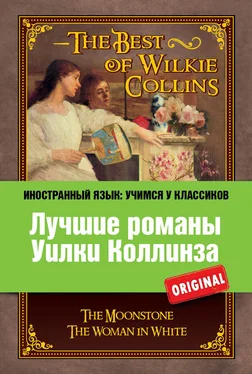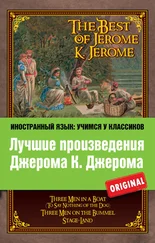For once in his life, the great Cuff stood speechless with amazement, like an ordinary man.
My mistress rang the bell, and ordered her water-proof things. It was still pouring with rain; and the close carriage had gone, as you know, with Miss Rachel to Frizinghall. I tried to dissuade her ladyship from facing the severity of the weather. Quite useless! I asked leave to go with her, and hold the umbrella. She wouldn’t hear of it. The pony-chaise came round, with the groom in charge. “You may rely on two things,” she said to Sergeant Cuff, in the hall. “I will try the experiment on Miss Verinder as boldly as you could try it yourself. And I will inform you of the result, either personally or by letter, before the last train leaves for London to-night.”
With that, she stepped into the chaise, and, taking the reins herself, drove off to Frizinghall.
My mistress having left us, I had leisure to think of Sergeant Cuff. I found him sitting in a snug corner of the hall, consulting his memorandum book, and curling up viciously at the corners of the lips.
“Making notes of the case?” I asked.
“No,” said the Sergeant. “Looking to see what my next professional engagement is.”
“Oh!” I said. “You think it’s all over then, here?”
“I think,” answered Sergeant Cuff, “that Lady Verinder is one of the cleverest women in England. I also think a rose much better worth looking at than a diamond. Where is the gardener, Mr. Betteredge?”
There was no getting a word more out of him on the matter of the Moonstone. He had lost all interest in his own inquiry; and he would persist in looking for the gardener. An hour afterwards, I heard them at high words in the conservatory, with the dog-rose once more at the bottom of the dispute.
In the meantime, it was my business to find out whether Mr. Franklin persisted in his resolution to leave us by the afternoon train. After having been informed of the conference in my lady’s room, and of how it had ended, he immediately decided on waiting to hear the news from Frizinghall. This very natural alteration in his plans – which, with ordinary people, would have led to nothing in particular – proved, in Mr. Franklin’s case, to have one objectionable result. It left him unsettled, with a legacy of idle time on his hands, and, in so doing, it let out all the foreign sides of his character, one on the top of another, like rats out of a bag.
Now as an Italian-Englishman, now as a German-Englishman, and now as a French-Englishman, he drifted in and out of all the sitting-rooms in the house, with nothing to talk of but Miss Rachel’s treatment of him; and with nobody to address himself to but me. I found him (for example) in the library, sitting under the map of Modern Italy, and quite unaware of any other method of meeting his troubles, except the method of talking about them. “I have several worthy aspirations, Betteredge; but what am I to do with them now? I am full of dormant good qualities, if Rachel would only have helped me to bring them out!” He was so eloquent in drawing the picture of his own neglected merits, and so pathetic in lamenting over it when it was done, that I felt quite at my wits’ end how to console him, when it suddenly occurred to me that here was a case for the wholesome application of a bit of ROBINSON CRUSOE. I hobbled out to my own room, and hobbled back with that immortal book. Nobody in the library! The map of Modern Italy stared at ME; and I stared at the map of Modern Italy.
I tried the drawing-room. There was his handkerchief on the floor, to prove that he had drifted in. And there was the empty room to prove that he had drifted out again.
I tried the dining-room, and discovered Samuel with a biscuit and a glass of sherry, silently investigating the empty air. A minute since, Mr. Franklin had rung furiously for a little light refreshment. On its production, in a violent hurry, by Samuel, Mr. Franklin had vanished before the bell downstairs had quite done ringing with the pull he had given to it.
I tried the morning-room, and found him at last. There he was at the window, drawing hieroglyphics [44]with his finger in the damp on the glass.
“Your sherry is waiting for you, sir,” I said to him. I might as well have addressed myself to one of the four walls of the room; he was down in the bottomless deep of his own meditations, past all pulling up. “How do YOU explain Rachel’s conduct, Betteredge?” was the only answer I received. Not being ready with the needful reply, I produced ROBINSON CRUSOE, in which I am firmly persuaded some explanation might have been found, if we had only searched long enough for it. Mr. Franklin shut up ROBINSON CRUSOE, and floundered into his German-English gibberish [45]on the spot. “Why not look into it?” he said, as if I had personally objected to looking into it. “Why the devil lose your patience, Betteredge, when patience is all that’s wanted to arrive at the truth? Don’t interrupt me. Rachel’s conduct is perfectly intelligible, if you will only do her the common justice to take the Objective view first, and the Subjective view next, and the Objective-Subjective view to wind up with. What do we know? We know that the loss of the Moonstone, on Thursday morning last, threw her into a state of nervous excitement, from which she has not recovered yet. Do you mean to deny the Objective view, so far? Very well, then – don’t interrupt me. Now, being in a state of nervous excitement, how are we to expect that she should behave as she might otherwise have behaved to any of the people about her? Arguing in this way, from within-outwards, what do we reach? We reach the Subjective view. I defy you to controvert the Subjective view. Very well then – what follows? Good Heavens! the Objective-Subjective explanation follows, of course! Rachel, properly speaking, is not Rachel, but Somebody Else. Do I mind being cruelly treated by Somebody Else? You are unreasonable enough, Betteredge; but you can hardly accuse me of that. Then how does it end? It ends, in spite of your confounded English narrowness and prejudice, in my being perfectly happy and comfortable. Where’s the sherry?”
My head was by this time in such a condition, that I was not quite sure whether it was my own head, or Mr. Franklin’s. In this deplorable state, I contrived to do, what I take to have been, three Objective things. I got Mr. Franklin his sherry; I retired to my own room; and I solaced myself with the most composing pipe of tobacco I ever remember to have smoked in my life.
Don’t suppose, however, that I was quit of Mr. Franklin on such easy terms as these. Drifting again, out of the morning-room into the hall, he found his way to the offices next, smelt my pipe, and was instantly reminded that he had been simple enough to give up smoking for Miss Rachel’s sake. In the twinkling of an eye, he burst in on me with his cigar-case, and came out strong on the one everlasting subject, in his neat, witty, unbelieving, French way. “Give me a light, Betteredge. Is it conceivable that a man can have smoked as long as I have without discovering that there is a complete system for the treatment of women at the bottom of his cigar-case? Follow me carefully, and I will prove it in two words. You choose a cigar, you try it, and it disappoints you. What do you do upon that? You throw it away and try another. Now observe the application! You choose a woman, you try her, and she breaks your heart. Fool! take a lesson from your cigar-case. Throw her away, and try another!”
I shook my head at that. Wonderfully clever, I dare say, but my own experience was dead against it. “In the time of the late Mrs. Betteredge,” I said, “I felt pretty often inclined to try your philosophy, Mr. Franklin. But the law insists on your smoking your cigar, sir, when you have once chosen it.” I pointed that observation with a wink. Mr. Franklin burst out laughing – and we were as merry as crickets, until the next new side of his character turned up in due course. So things went on with my young master and me; and so (while the Sergeant and the gardener were wrangling over the roses) we two spent the interval before the news came back from Frizinghall.
Читать дальше
Конец ознакомительного отрывка
Купить книгу












